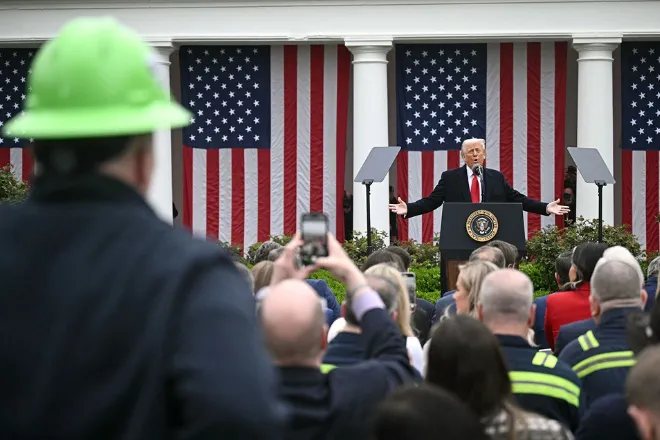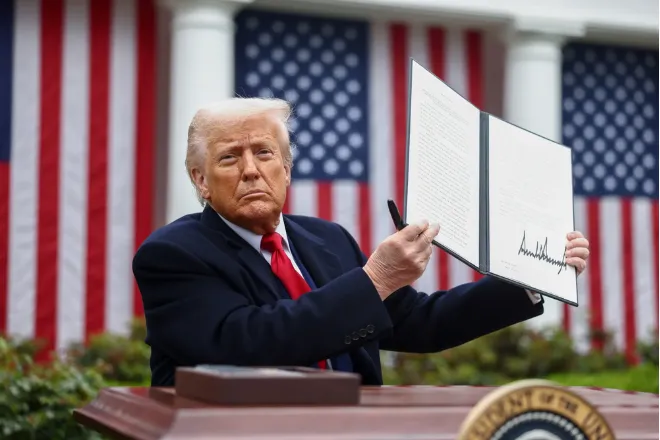Trump’s global tariffs, which impact trillions in trade value, now face a decisive court battle as businesses claim presidential powers were misused to implement the controversial economic policy
Contents
Key Points:
- Legal battle over Trump’s global tariffs reaches critical stage in US Court of International Trade
- Small businesses challenge the emergency powers used to implement widespread tariffs
- Court ruling could impact trillions of dollars in global trade and Trump’s economic agenda
President Donald Trump’s controversial global tariffs, implemented through his “Liberation Day” executive order, are facing a significant legal challenge that could determine the future of his economic policy. A coalition of small businesses has petitioned the US Court of International Trade to block these sweeping tariffs, arguing that the President has exceeded his authority.
Trump’s Global Tariffs: The Legal Battleground
On Tuesday, a three-judge panel in Manhattan heard arguments from small business representatives and lawyers for the Trump administration. At the heart of the dispute is whether Trump properly used the International Emergency Economic Powers Act (IEEPA) to justify imposing massive tariffs on imports.
“This represents an unprecedented and unlawful expansion of presidential authority,” argued Jeffrey M. Schwab, attorney for the small businesses from the conservative Liberty Justice Center. Schwab contended that Trump’s order would effectively allow him to impose tariffs “on any country at any rate at any time simply by declaring a national emergency, without meaningful judicial review.”

The Emergency Powers Question
Trump’s global tariffs rely on his declaration that America’s “large and persistent” annual trade deficits constitute “an unusual and extraordinary threat” to national security and the economy. This declaration activated emergency powers typically reserved for sanctions during genuine crises.
The business plaintiffs argue this reasoning is fundamentally flawed:
- Trade deficits do not qualify as emergencies or extraordinary threats
- The IEEPA was never intended to authorize broad-based tariffs
- The unpredictable implementation has created market chaos and business uncertainty
Trump Administration’s Defense of Global Tariffs
Justice Department attorney Eric Hamilton defended the president’s actions, arguing that the “cumulative effects” of the annual trade deficit actually threatens the U.S. economy and supply chain security. Hamilton also argued that the court has no jurisdiction to consider Trump’s assessment of what constitutes an extraordinary threat.
“That is a political question,” Hamilton told the panel, citing precedent from the Nixon era when similar emergency laws were used during a currency crisis.
See more related articles:
Wider Implications for Trump’s Economic Agenda
The outcome of this case could have far-reaching implications for Trump’s overall economic strategy. Since the April 2 executive order announcing the global tariffs, financial markets have been volatile, with trillions of dollars in market value shifting due to announcements of delays, reversals, or trade negotiations.
This lawsuit is just one of several legal challenges to Trump’s tariff policies:
- Democratic-led states have filed separate complaints
- The Blackfeet Nation tribe in Montana has challenged the tariffs
- Additional hearings are scheduled for next week on related cases
What’s Next for Trump’s Global Tariffs
The trade court did not immediately issue a ruling, which will come at a later date. Any decision is likely to be appealed, with the US Supreme Court potentially having the final say on whether Trump’s global tariffs can proceed.

Market analysts note that temporary restraining orders are rare in such cases, as plaintiffs often find it difficult to prove irreparable harm if they can later recover financial compensation.
For businesses navigating the uncertainty of Trump’s global tariffs, the court’s eventual ruling represents a pivotal moment that could either validate or severely restrict the President’s aggressive trade policies.
